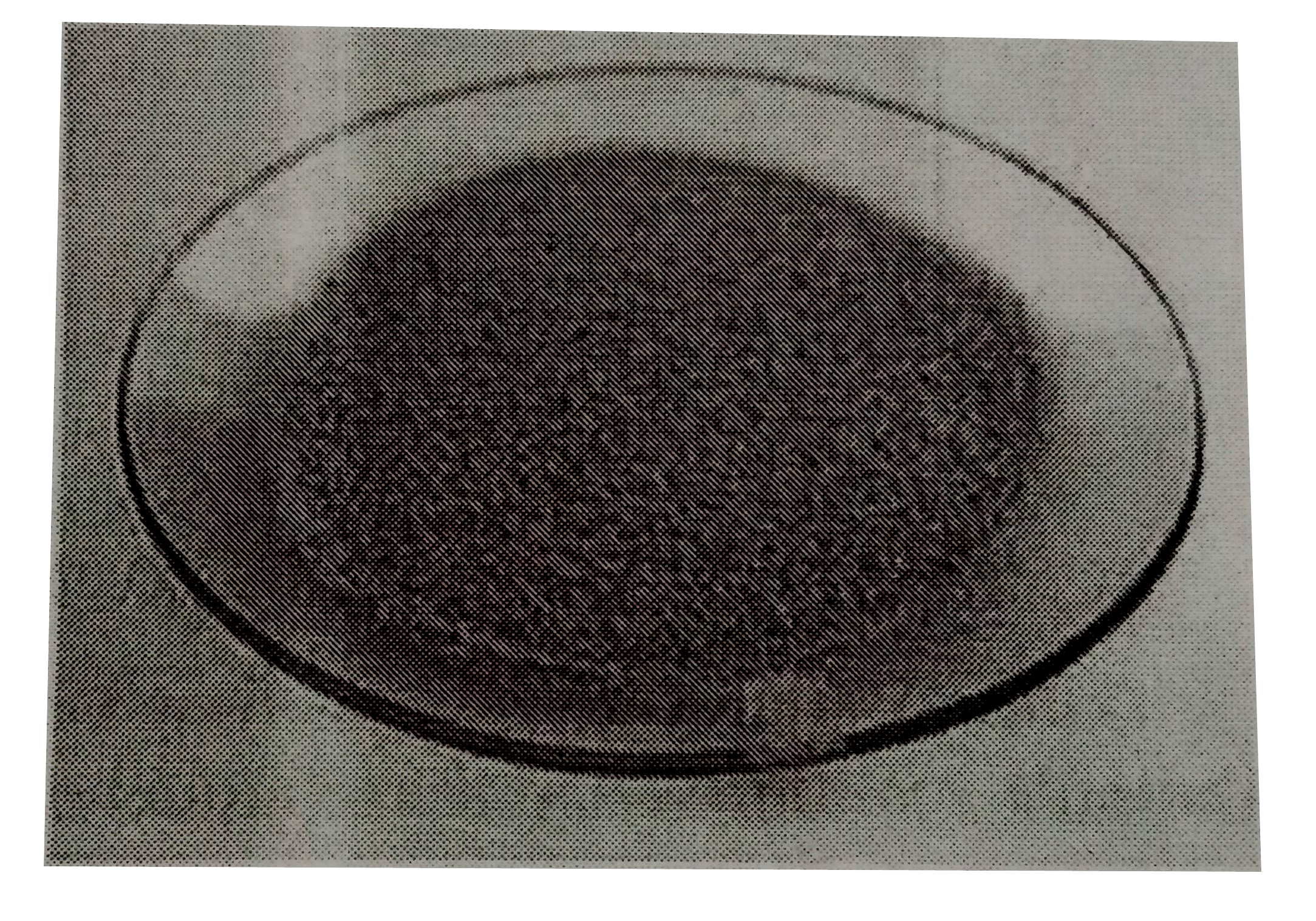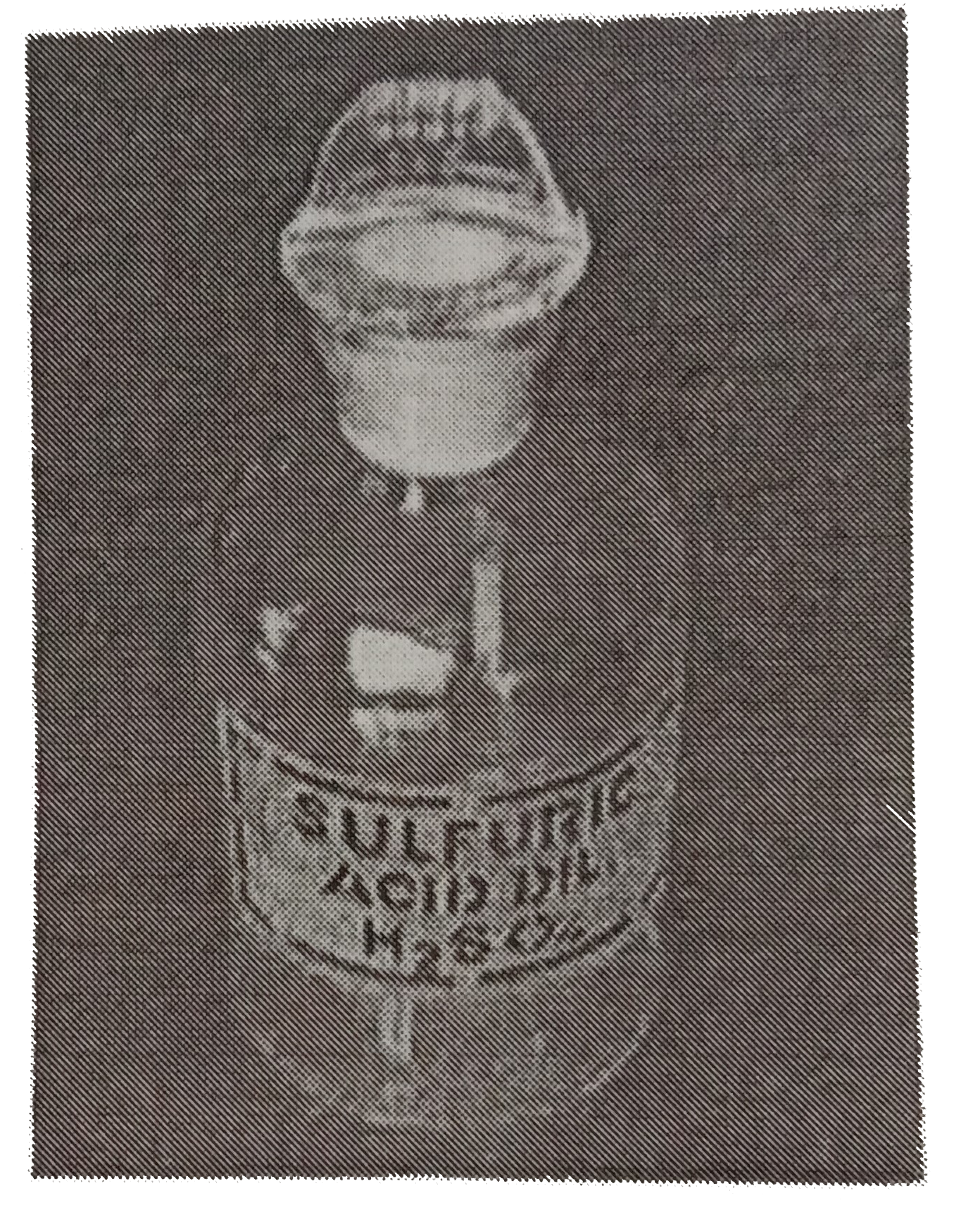Complete Solutions to Solved Examples of chapter ATOMS AND MOLECULES of Class 9 book with complete answers and questions
| Class 9 | CHEMISTRY |
| Chapter | ATOMS AND MOLECULES |
| LAKHMIR SINGH & MANJIT KAUR | Solved Examples |
| Number Of Questions | 47 |
| Academic Year | 2023-24 |
Sodium carbonate reacts with ethanoic acid to form sodium ethanote, carbon dioxide and water. In an experiment, `5.3` g of sodium carbonate reacted with `6` g of ethanoic acid to form `8.2` g of sodium ethanoate, `2.2` g of carbon dioxide and `0.9` g of water. Show that this data verifies the law of conservation of mass.
View SolutionCalcium carbonate decomposes, on heating , to form calcium oxide and carbon dioxide. When 10 g of calcium carbonate is decomposed completely, then `5.6 g` of calcium of oxide is formed. Calculate the mass of carbon dioxide formed. Which law of chemical combination will you use in solving this problem ?
View SolutionIn an experiment, `1.288` g of copper oxide was obtained from `1.03` g of copper. In another experiment `3.672` g of copper oxide gave, on reduction, `2.938` g of copper. Show that these figures verify the law of constant proportions.
View SolutionHydrogen and oxygen combine in the ratio of 1:8 by mass to form water. What mass of oxygen gas would be required to react completely with 3 g of hydrogen gas?
View SolutionWhen 3.0 g of carbon is burnt in 8.00 g oxygen, 11.00 g of carbon dioxide is produced. What mass of carbon dioxide will be formed when 3.00 g of carbon is burnt in 50.00 g of oxygen? Which law of chemical combination will govern your answer?
View SolutionA `0.24 g` sample of compound of oxygen and boron was found by analysis to contain `0.096 g` of boron and `0.144 g` of oxygen. Calculate the percentage composition of the compound by mass.

View SolutionCalculate the molecular mass of sulphuric acid `(H_(2)SO_(4))`.
(Given : Atomic masses : `H = 1u , S = 32 u , O = 16 u`).

View SolutionWrite down the names of compounds represented by the following formulae. Also show the ions present in them :
(i) `Al_(2)(SO_(4))_(3)` , (ii) ` CaCl_(2)` , (iii) `K_(2)SO_(4)` , (iv) ` KNO_(3)` , (v) `CaCO_(3)`
View SolutionCalculate the formula mass of potassium carbonate `(K_(2)CO_(3))` (Given : Atomic masses : `K = 39u , C = 12 u , O = 16 u`)
View SolutionWork out the formula of carbon dioxide.
View SolutionWork out the formula of hydrogen chloride.
View SolutionThe valency of carbon is 4 and that of chlorine is 1. What will be the formua of carbon tetrachloride ?
View SolutionThe valency of an element X is 1 and that of oxygen is 2. What will be the formula of the compound formed by the combination of element X with oxygen ?
View SolutionAn element `E` has a valency of `4`.
(i) What will be the formula of its chloride ?
(ii) What will be the formula of its sulphide ?
View SolutionAn element X shows two valencies of 3 and 5. Work out the formulae of two oxides of this element.
View SolutionAn element `Z` forms an oxide `ZO_(3)`.
(a) What is the valency of element `Z` ?
(b) What will be the formula of fluoride of `Z` ?
View SolutionWork out the formula for magnesium chloride.
View SolutionWork out the formula for aluminium sulphate .
View SolutionThe symbols of some of the ions are given below :
`K^(+) , Al^(3+) , Br^(-) , O^(2-)`
Using this information, write down the formulae of :
(i) Aluminium bromide
(ii) Potassium oxide
View SolutionThe valencies of two elements A and B are given below :
`{:("Element",,"Valency"),(A,,1+),(B,,2+):}`
(i) What is formula of sulphate of A ?
(ii) What is the formula of nitrate of B ?
View SolutionThe formula of the chloride of a metal is `MCl_(2)`. What will be the formula of its sulphate.
View SolutionCalculate the molar mass of the following substances.
(a) Ethyne, `C_(2)H_(2)`
(b) Sulphur molecule, `S_(8)`
(c) Phosphorus molecule, `P_(4)` (Atomic mass of phosphorus = `31`)
(d) Hydrochloric acid, `HCl`
(e) Nitric acid, `HNO_(3)`
View SolutionHow many moles are 5 grams of calcium ? (Atomic mass of calcium `= 40 u`).
View SolutionWhat is the mass of 4 moles of aluminium atoms?
(Atomic mass of `Al = 27 u`)
View SolutionCalculate the number of atoms in `0.2` mole of sodium (Na).
View SolutionHow many moles are `9.033 xx 10^(24)` atoms of helium (He) ?
View SolutionCalculate the number of iron atoms in a piece of iron weighing `2.8 g` (Atomic mass of iron `= 56 u`).
View SolutionIf one mole of carbon atoms weighs 12 grams, what is the mass (in grams) of 1 atom of carbon?
View SolutionWhich has more number of atoms, `100` grams of sodium or `100` grams of iron (given, atomic mass of `Na = 23 u, Fe = 56 u`)?
View SolutionIf 1 g of sodium carbon contains x atoms, what will be the number of atoms in 1 g of magnesium ? `(C= 12u, Mg = 24 u)`
View SolutionHow many grams of neon will have the same number of atoms as `4` grams of calcium ? (Atomic masses : `Ne = 20 u, Ca = 40 u`)
View SolutionThe mass of a single atom of an element X is `2.65 xx 10^(-23) g`. What is its atomic mass ? What could this element be ?
View SolutionWhat is the mass of each one of the following ?
(a) `1` mole of water `(H_(2)O)` , (b) `1` mole of ethanol `(C_(2)H_(6)O)`
(c) `1` mole of glucose `(C_(6)H_(12)O_(6))` , (d) `1` mole of cane sugar `(C_(12)H_(22)O_(11))`
(Atomic masses : ` H = 1 u , C = 12 u , O = 16 u`)
View SolutionConvert `22` g of carbon dioxide `(CO_(2))` into moles. (Atomic masses : `C = 12 u, O = 16 u`)
View SolutionWhat is the mass of `0.5` mole of water `(H_(2)O)`.
(Atomic masses : `H = 1 u, O = 16 u`)
View SolutionWhat is the number of molecules in `0.25` moles of oxygen ?
View SolutionWhat is the number of molecules in `0.25` moles of oxygen ?
View SolutionConvert `12.044 xx 10^(22)` molecules of sulphur dioxide into moles.
View SolutionWhat is the number of water molecules contained in a drop of water weighing `0.06 g` ?
View SolutionCalculate the mass of `3.011 xx 10^(24)` molecules of nitrogen gas `(N_(2))`. (Atomic mass : `N = 14 u`)
View SolutionThe absolute mass of one molecules of a substance is `5.32 xx 10^(-23) g`. What is its molecular mass ? What could this substance be ?
View SolutionIn which one of the following cases the number of hydrogen atoms is more ?
Two moles of `HCl` or One mole of `NH_(3)`
View SolutionCalculate the mass of 1 mole of each one of the following:
(a) `NaCl` , (b) `CaCO_(3)` , (c ) `FeSO_(4).7H_(2)O` , (d) `Na_(2)O_(2)`
(Atomic masses : `H = 1 u , C = 12 u, O = 16 u , Na = 23 u , S = 32 u , Cl = 35.5 u , Ca = 40 u, Fe = 56 u`)
View SolutionWhich contains more molecules, 4 g of methane `(CH_(4))` or 4g of oxyen `(O_(2))` ?
(Atomic masses : `C = 12 u, H = 1 , O = 16 u`)
View SolutionIf `1` g of sulphur dioxide contains `x` molecules, what will be the number of molecules in `1` g of methane ? `(S = 32 u, O = 16 u, C = 12 u, H = 1 u)`
View SolutionHow many grams of oxygen gas contain the same number of molecules as `16` grams of sulphur dioxide gas ? `(O = 16 u , S = 32 u)`
View SolutionCalculate the number of aluminium ions present in 0.051 g of aluminium oxide.
(Hint: The mass of an ion is the same as that of an atom of the same element. Atomic mass of Al = 27 u)
View Solution
Solved Examples questions and complete solutions for chapter ATOMS AND MOLECULES of S CHAND CHEMISTRY (HINGLISH) of Class 9